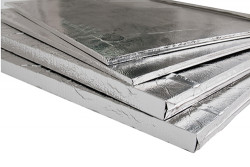High-tech building insulation: EU research project INNOVIP to develop new technologies for long-lasting and cost-effective vacuum insulation panels
The INNOVIP project, which has received around Euro 5 million of EU funding, aims to solve these problems through innovative technologies and the development of new materials. The international project team led by the Munich-based Forschungsinstitut für Wärmeschutz e. V. (research institute for thermal insulation, known as FIW Munich) will be working towards a further improvement in the efficiency of the VIPs as well as the development of features such as anti-mould coatings and increased fire resistance. Effective insulation systems in buildings are key to optimising their energy performance. Vacuum insulation panels, or VIPs, are an extremely effective and space-saving solution. They utilise the fact that a vacuum is an extremely good insulator. VIPs comprise a porous core material encased in an airtight envelope. The air trapped in these layers is evacuated and the envelope is then heat-sealed. The core material prevents the insulation panels from crumpling when the air is evacuated. Currently, vacuum insulation panels generally comprise a core of pressed pyrogenic silica or mineral fibres. Using a new type of protective envelope and alternative fillers – for example perlite – the INNOVIP consortium, which includes research institutes and companies from seven EU countries and Israel, aims to enhance the competitiveness of this highly-efficient solution. Specifically, the project partners have defined the following goals: - to improve the thermal performance by at least 25% - to achieve a minimum standardised service life of 25 years with minimum deterioration - to develop an innovative production process incorporating simplified wrapping procedures, and through this to reduce manufacturing costs by 30% compared with those of conventional vacuum insulation panels - to reduce insulation material costs by around 30% compared to established vacuum insulation systems and conventional insulating materials (based on the cost per square metre of thermally equivalent insulation systems) - to provide additional functionality and durability including resistance to deleterious effects such as mould growth To read the full press release, please visit http://www.bayfor.org/innovip-en(opens in new window). To learn more about the project, please visit http://innovip-h2020.eu(opens in new window). Contact Christoph Sprengard Coordinator INNOVIP FIW Munich Phone: +49 (0)89 8580058 E-mail: sprengard@fiw-muenchen.de
Keywords
Countries
Germany, Denmark, Spain, France, Israel, Italy, Poland, Portugal, United Kingdom



